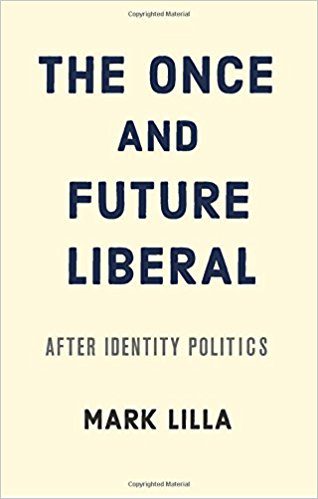Democrats: ‘The Party Of Jessica Yogamat’

From an Edward Luttwak piece on Hillary Clinton’s failure to win the White House:
Instead of recognizing that the political implications of the income redistribution of globalized capitalism made Sanders and Trump the only two valid candidates, the leading commentators did the very opposite: they asserted in tones of unassailable certainty that both men were irremediably unelectable. That was, admittedly, a perfectly reasonable conclusion, given that neither happened to have a party to support them, which was then still considered the presumed prerequisite of electoral victories. And it was also true enough that Sanders could not hope for party support because of the professional contempt of with-it Democratic officials for the ageing socialist, who stubbornly failed to recognize the absolute centrality of identity politics in the third millennium, and who therefore persisted in talking of rich and poor, instead of African Americans, Hispanics, Native Americans, Aleuts, Asian-Americans, LGBT Americans, even white ones, if quietly.
Luttwak also faults the GOP leadership for its blindness to what has actually happened in the United States in the post-Reagan era, regarding deindustrialization, thus paving the way forward for Trump.
Contemplating the fragility and intellectual decline of both parties is unavoidable for readers of Mark Lilla’s forthcoming book The Once And Future Liberal, which will be in bookstores on August 15. I read it in one sitting this weekend — a tribute to its ability to engage the reader, but also to its length. This polemical book is short, only 141 pages, but this is a virtue. It’s exactly as long as it needs to be. Though it’s a book written by a liberal Democrat for liberal Democrats, every conservative who cares about the future of American politics should read it. Somebody on the Right — I’m looking at you, Michael Brendan Dougherty — needs to pen a similar volume for our side.
I’ll be conducting and publishing and interview with Lilla later this week, and I expect to write a few posts about it, because there’s so much there to unpack. But for now, a few opening thoughts.
The thesis of Liberal is that the Democratic Party, and liberalism in general, has shipwrecked itself on the shoals of identity politics. “We have been repudiated in no uncertain terms,” he writes. “Donald Trump the man is, frankly, not the greatest of our worries. And if we don’t look beyond him there is very little hope for us.”
Lilla, who teaches humanities at Columbia, continues:
American liberalism in the twenty-first century is in crisis: a crisis of imagination and ambition on our side, a crisis of attachment and trust on the other side of the wider public.
The book is dedicated to diagnosing that crisis and prescribing a cure. Lilla describes himself as a “frustrated American liberal.” He begins by saying that since Reagan, the core strength of the GOP has been that it has been able to produce “an image of what our shared way of life might be.” Liberalism has not, he claims — not even under its two recent presidents, Bill Clinton and Barack Obama. Technocratic liberalism is not a compelling vision.
Lilla says that American political history of the last century contains two “dispensations” — a term meaning “system of order” related to a particular time. The Roosevelt Dispensation was a time that focused on collective responsibility for each other, against economic hardship, and later, against racial injustice and similar wrongs. By the end of the 1970s, this dispensation petered out with stagnation and failure. The Reagan Dispensation was the political response. It focused on individualism and self-reliance. In the first dispensation, government was a solution. In the second, government was a problem.
Lilla argues that liberalism failed to articulate a new vision of what America should be like based on what unites Americans. Instead, it gave itself over to identity politics, which “became the de facto creed of two generations of liberal politicians, professors, schoolteachers, journalists, movement activists, and officials of the Democratic Party.” Ironically, says Lilla, this only reinforced the core principle of Reaganism: individualism.
Lilla:
The main result has been to turn young people back onto themselves, rather than turning them outward toward the wider world. It has left them unprepared to think about the common good and what must be done practically to secure it — especially the hard and unglamorous task of persuading people very different from themselves to join a common effort. Every advance of liberal identity consciousness has marked a retreat of liberal political consciousness. Without which no vision of Americans’ future can be imagined.
Lilla says Democrats keep losing not because they have drifted too far to the left or to the right. “They are losing because they have retreated into caves they have carved for themselves in the side of what once was a great mountain.”
 Lilla has a knack for pithy, stinging phrasing. Look around, he says to fellow liberals, and see that the Republican Party, at the state level, dominates. They keep winning elections. They do so in large part because “they have successfully persuaded much of the public that they are the party of Joe Sixpack and Democrats are the party of Jessica Yogamat.”
Lilla has a knack for pithy, stinging phrasing. Look around, he says to fellow liberals, and see that the Republican Party, at the state level, dominates. They keep winning elections. They do so in large part because “they have successfully persuaded much of the public that they are the party of Joe Sixpack and Democrats are the party of Jessica Yogamat.”
If liberals really want to improve the lots of minorities within their broad coalition, they have to first win elections. But the way they think of politics all but guarantees that they won’t. Lilla visits the Democratic Party’s website, with its pages and pages for various identity constituencies, and moans, “You might think that, by some mistake, you have landed on the website of the Lebanese government — not that of a party with a vision of America’s future.” He writes:
Identity liberalism has ceased being a political project and has morphed into an evangelical one. The difference is this: evangelism is about speaking truth to power. Politics is about seizing power to defend the truth.
Lilla correctly sees this moment as a real opportunity for Democrats. Trump’s election marks the end of the Reagan Dispensation too, but the Republican Party has not come to terms with this fact. Yes, they hold power, but Trump is only nominally a Republican, and there is nobody in the party establishment articulating a compelling vision to address the problems and the conditions that empowered Trump to smash the establishment’s power. The future really is up for grabs. The Once And Future Liberal is a punchy, no-b.s. guide to how the Democrats can make the future their own.
I’ll be writing about it all week, so I don’t want to jam too much of the book into this one post. There’s a lot to chew over in it. I will say in this introductory post that I think this book is not going to be well-received on the Left, precisely because it assaults the sacred cow of identity politics. Most on the Left, I think, will interpret the book as saying that if they want to win power, they have to tell blacks, gays, and all the other subgroups to go to the back of the bus (the inevitable metaphor). Lilla does not say this at all. His argument, rather, is that if Democrats want to secure and advance rights for those groups (as he does), they are going to first have to start winning elections again. This they cannot do unless they come up with a real vision of solidarity, of the whole being greater than the sum of its parts. My guess is that the leadership class within Democratic politics has come to think of identity politics as a kind of religion, such that to abandon it in any way feels like heresy. They won’t be able to confront honestly the argument Lilla makes because to do so would compel them to rethink radically the principles that give them their political identity.
I could be wrong. I hope I’m right, because if the Democrats take Lilla seriously, they will be a formidable opponent. The best thing from my point of view would be for Republicans to read this book, and to take its insights into how changing economic conditions are giving birth to a new, as yet undefined dispensation, and recreate the GOP to make it responsive to the world as it is.
There is no going back to a pre-Trump era, for either party. The future is not Hillary Clinton, or the class of Democrats she represents. The long-term future of the GOP is not Donald Trump, but neither is it any of the creatures of the Republican establishment that Trump demolished in the 2016 primaries.
I have my doubts that either party can confidently and meaningfully claim to be the party of American solidarity, for reasons I’ll get into later this week, as we talk about Lilla’s must-read new book.
Subscribe for as little as $5/mo to start commenting on Rod’s blog.